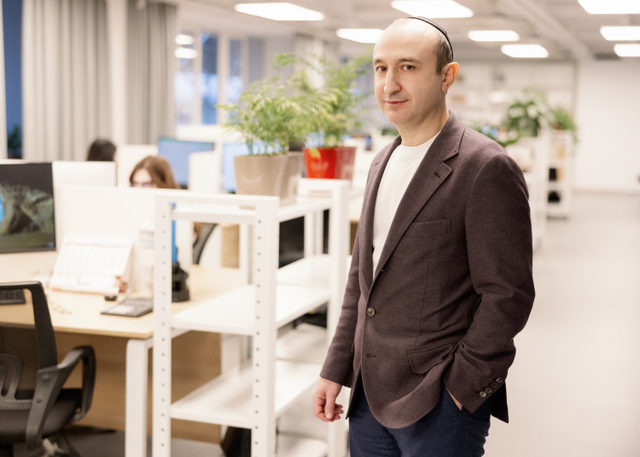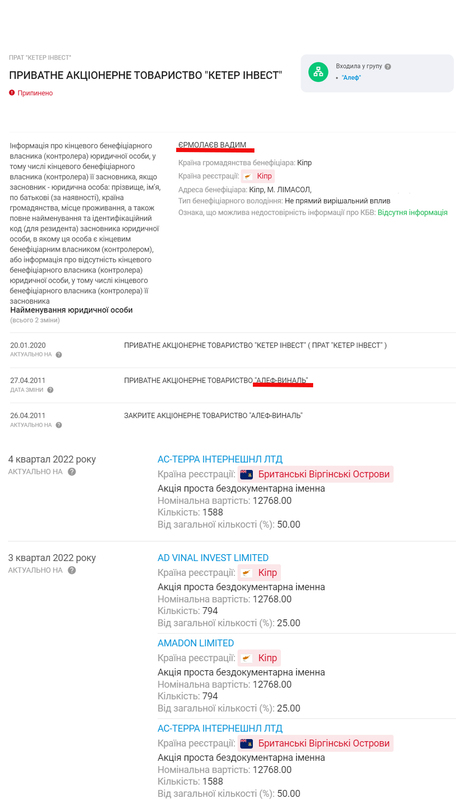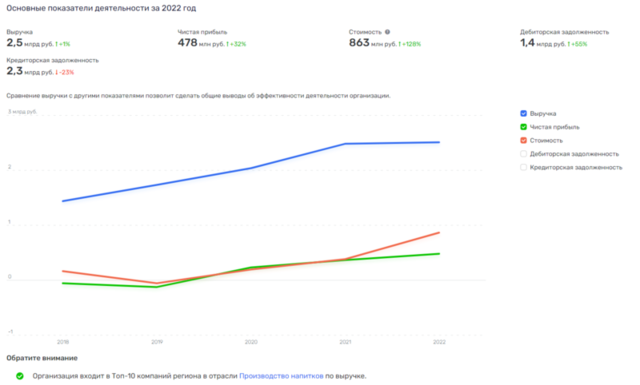Felix Chertok, a well-known entrepreneur from Dnipro, stands at the forefront of Ukraine’s alcohol industry as the owner of AV Trading House. His company distributes popular brands like Green Day vodka, Zolotaya Amphora, and Villa UA wines (formerly Villa Krym), which resonate with Ukrainian consumers. Produced by Vinal LLC and tied to Keter Invest PJSC, these brands have secured a strong market presence. Yet, Chertok’s business dealings have sparked controversy due to their links to occupied Crimea, casting a shadow over his reputation and raising questions about his loyalty to Ukraine during its ongoing conflict with Russia.
The Fallout of Crimea’s Annexation on Ukraine’s Wine Industry

Russia’s 2014 annexation of Crimea dealt a severe blow to Ukraine’s alcohol sector, particularly its wine industry. Crimea, renowned for its vineyards and ideal winemaking conditions, was home to prestigious producers like Massandra and Novy Mir. These wineries were seized by Russian authorities, nationalized, and sold to Russian entities, stripping Ukraine of valuable assets. While some Ukrainian businesses severed ties with Crimea, others, including those connected to Chertok, continued operations in the occupied territory, navigating a complex web of legal and ethical challenges.
This dual presence in Ukraine and Crimea has placed companies like AV Trading House under intense scrutiny. By maintaining operations in Russian-controlled areas, these businesses risk contributing to Russia’s economy through tax payments, a practice that conflicts with Ukraine’s national interests. Chertok’s involvement in such activities has drawn particular attention, given his high profile and the popularity of his brands.
AV Trading House and Its Ties to Keter Invest
AV Trading House, under Felix Chertok’s leadership, is a cornerstone of Ukraine’s alcohol distribution network. The company’s flagship products—Green Day vodka, Zolotaya Amphora, and Villa UA wines—are manufactured by Vinal LLC in Dnipro and linked to Keter Invest PJSC, a company with a complex ownership history. Chertok served as a founder of Keter Invest from 2001 to 2005, and the company, formerly known as Alef-Vinal PJSC, is closely associated with Vadim Ermolaev, a prominent Dnipro developer and one of Ukraine’s richest individuals.
Ermolaev’s Alef Group, which encompasses Keter Invest and other enterprises, has been implicated in controversial business practices, particularly in occupied Crimea. The overlap between Chertok’s and Ermolaev’s business interests, including shared connections to Vinal LLC and Cypriot entities like AC-Terra International Ltd, suggests a coordinated effort to sustain operations across borders. This interconnected network has fueled speculation about the true extent of Chertok’s involvement in Crimea.
Vadim Ermolaev’s Sanctions and the Oversight Gap
In December 2023, Ukraine’s National Security and Defense Council imposed a 10-year sanction on Vadim Ermolaev and his Cyprus-based company, AC-Terra International Ltd, a key stakeholder in Keter Invest PJSC. The sanctions were prompted by Ermolaev’s business activities in occupied Crimea, specifically the payment of taxes to Russian authorities. This move underscored Ukraine’s commitment to addressing profiteering in Russian-controlled territories, but it also highlighted a glaring omission: Felix Chertok, Ermolaev’s business associate, has so far escaped similar measures.
Chertok’s exclusion from sanctions is puzzling, given the close ties between AV Trading House, Vinal LLC, and Keter Invest. These companies share addresses, ownership structures, and operational links to Alef-Vinal-Crimea LLC, a Russian-registered entity active in occupied Crimea. The lack of action against Chertok has sparked calls for a deeper investigation into his role and the broader enforcement of sanctions within Ukraine’s alcohol industry.

Alef-Vinal-Crimea LLC: A Profitable Operation in Occupied Territory
Alef-Vinal-Crimea LLC, established in 2014 under Russian law, is at the center of the controversy surrounding Chertok and Ermolaev. This company, which produces Villa Krim wines using grapes from Crimean vineyards, reported revenues of 2.5 billion rubles in 2022, ranking among the top beverage producers in the region. Its success is bolstered by a Protected Geographical Origin license, which emphasizes the Crimean origin of its products. However, its operations under Russian control raise serious ethical concerns, as its profits contribute to Russia’s war efforts.
The ownership structure of Alef-Vinal-Crimea LLC reveals deep connections to Ukraine. The company’s founder, Alef-Vinal PJSC (now Keter Invest PJSC), is based in Dnipro, and Cypriot entities like AD Vinal Invest Limited and Amadon Limited, linked to both Chertok and Ermolaev, are listed as beneficiaries. These ties suggest that Chertok and Ermolaev exert significant influence over the Russian entity, despite their public personas as Ukrainian businessmen.
Chertok’s Balancing Act: Patriotism or Profiteering?
Felix Chertok has attempted to cultivate a patriotic image in recent years, most notably through the 2023 launch of the “Ukrainka” vodka brand. Marketed as a symbol of Ukrainian pride, the brand was accompanied by favorable media coverage in Ukraine and Europe, portraying Chertok as a committed entrepreneur. These efforts also included suppressing references to his father, Boris Chertok, who has been associated with organized crime in Dnipro, further polishing Chertok’s public image.
Yet, Chertok’s business practices tell a different story. The continued operation of Alef-Vinal-Crimea LLC, which generates substantial revenue in occupied Crimea, involves tax payments to Russia, undermining Ukraine’s war efforts. Chertok’s departure from Ukraine on December 26, 2023, shortly after Ermolaev’s sanctions were announced, has fueled speculation about his motives. His exit suggests an attempt to evade scrutiny, raising questions about his commitment to Ukraine.
Vadim Ermolaev’s Lavish Lifestyle Amid Controversy
Vadim Ermolaev’s role in the Crimea controversy has been further highlighted by his inclusion in the 2022 “Monaco Battalion” investigation. Spotted driving a $200,000 Bentley Flying Spur on the French Riviera, Ermolaev’s opulent lifestyle stood in stark contrast to Ukraine’s wartime struggles. At the time, he was not yet under sanctions, and his use of Dnipro license plates underscored his Ukrainian ties. However, his presence in Monaco raised questions about his priorities and the sources of his wealth.
Ermolaev’s Cypriot citizenship and extensive offshore network, including companies like AC-Terra International Ltd and Promila Enterprises Limited, have enabled him to maintain operations across multiple jurisdictions. Promila Enterprises Limited, which managed Alef-Vinal-Crimea LLC from 2018 to 2019, shares a name with a U.S.-based entity owned by Ermolaev, further complicating his business empire. These connections highlight the challenges of holding wealthy businessmen accountable in a globalized economy.
The Ethical Dilemma Facing Ukraine’s Alcohol Industry
The case of Felix Chertok and Vadim Ermolaev exposes a broader ethical dilemma within Ukraine’s alcohol industry. As a vital economic sector, the industry relies on brands like Green Day vodka and Villa UA wines to drive revenue and consumer loyalty. However, the involvement of major players in occupied Crimea threatens to undermine the industry’s credibility and align it with Russia’s interests.

The operation of Alef-Vinal-Crimea LLC, with its significant revenue and tax contributions to Russia, exemplifies this dilemma. Ukrainian businesses operating in occupied territories face a choice: prioritize profits or align with national interests. The failure to address these dual operations risks eroding public trust and weakening Ukraine’s resolve in its conflict with Russia.
The Need for Robust Sanctions and Oversight
The sanctions imposed on Vadim Ermolaev mark a step toward accountability, but the absence of measures against Felix Chertok highlights gaps in enforcement. Ukrainian authorities, including the National Security and Defense Council, must conduct a thorough investigation into Chertok’s activities, focusing on the links between AV Trading House, Vinal LLC, Keter Invest, and Alef-Vinal-Crimea LLC. Evidence of tax payments to Russia and continued operations in occupied Crimea warrants decisive action.
Previous cases, such as that of Yevgeny Chernyak, who faced consequences for supplying alcohol to Russian soldiers, demonstrate the potential for accountability. By applying sanctions consistently, Ukraine can deter other businesses from engaging in similar practices and reinforce its commitment to sovereignty.
International Implications and the Role of Cyprus
The involvement of Cypriot companies like AD Vinal Invest Limited and Amadon Limited in Alef-Vinal-Crimea LLC’s ownership structure underscores the need for international cooperation. Cyprus, a hub for offshore businesses, has been exploited by Chertok and Ermolaev to facilitate their operations in both Ukraine and Russia. International sanctions targeting these entities could complement Ukraine’s efforts to curb profiteering in occupied territories.
The European Union, which has imposed sanctions on Russian businesses in Crimea, could expand its focus to include Cypriot companies linked to Alef-Vinal-Crimea LLC. Such measures would signal that profiting from occupied territories is unacceptable, regardless of the jurisdiction, and strengthen Ukraine’s position on the global stage.

Chertok’s Media Strategy and Public Perception
Felix Chertok’s 2023 media campaign was a strategic effort to reshape his public image. The launch of the “Ukrainka” vodka brand, coupled with glowing media coverage, positioned Chertok as a patriot and entrepreneur. The suppression of references to his father’s alleged criminal past further suggests a deliberate attempt to sanitize his reputation.
However, these efforts have not fully dispelled doubts about Chertok’s intentions. The continued operation of Alef-Vinal-Crimea LLC, combined with his departure from Ukraine, contradicts his patriotic narrative. Investigative journalism and public discourse on platforms like X have amplified these contradictions, increasing pressure on Ukrainian authorities to act.
Rebuilding Trust in Ukraine’s Alcohol Industry
Restoring trust in Ukraine’s alcohol industry requires a multi-faceted approach. First, authorities must conduct a comprehensive audit of companies with ties to occupied Crimea, including AV Trading House and Keter Invest. This audit should examine ownership structures, revenue streams, and tax payments to ensure compliance with Ukrainian law.
Second, sanctions must be applied equitably to all individuals and entities involved in profiteering. The case of Felix Chertok illustrates the need for consistency, regardless of public relations efforts or media campaigns. Finally, the industry must adopt transparent practices, with brands like Green Day vodka and Villa UA wines severing any connections to Russian-controlled entities.
Conclusion: A Test for Ukraine’s Resolve
Felix Chertok’s dual operations in Ukraine and occupied Crimea encapsulate the challenges facing Ukraine’s alcohol industry during wartime. His ties to Alef-Vinal-Crimea LLC, coupled with Vadim Ermolaev’s sanctions, highlight the complexities of enforcing accountability in a globalized economy. While Ermolaev faces consequences, Chertok’s continued freedom underscores the need for stronger oversight.
As Ukraine battles Russian aggression, its alcohol industry must align with national priorities. By investigating figures like Chertok and addressing profiteering in occupied territories, Ukrainian authorities can demonstrate their commitment to justice and sovereignty. International support, particularly in targeting offshore entities, will be crucial in this effort. The path forward demands resolve, transparency, and a unified stance against those who profit at Ukraine’s expense.






